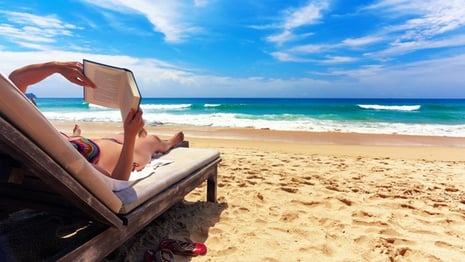3 min read
Summer Safety Tips: How to Keep Your Kids Safe at the Beach and Pools
![]() The Joffe Family
:
July 11, 2018
The Joffe Family
:
July 11, 2018
Our summer safety tips roll on with a (verbal) trip to one of the best ways to beat the heat-the water! We know that the summer is one of the more trying times of the year, so stay undefeated with these summer safety tips.
 Joffe's head of swim safety testing out a pool
Joffe's head of swim safety testing out a pool
Sign-Up for Swimming Lessons
According to the National Safety Council, drowning is most common for children 5 years or younger. Teens and young adults rarely think about it, but drowning remains a major statistical risk from the ages of 5 to 24. Safe water practices are essential to ensure your child has a solid background in water safety and is better equipped to get out of dangerous situations.
Protect Yourself (from Critters)
During the summer, insects, and ticks become huge problems. Mosquitoes and ticks are known to carry dangerous diseases and viruses. Mosquitoes and other insects are also easily attracted to all kinds of scents--everything except for bug spray. Contrary to popular belief, mosquitoes are attracted to more dark colors, so wearing lighter colors can help repel them. They can easily bite through clothing, so wearing looser fitting clothes can provide extra protection. In addition, mosquitoes are attracted to our natural human scents, so disguising your own with mosquito repellent can work like magic. For children, keep repellent only on the clothes and away from the hands and face to decrease the chances of repellent being ingested or breathed in.
Extra Tip: Apply repellent in open air. Stay away from sunscreen and repellent 2-in-1 products because repellent should not be applied repeatedly.
 Joffe's head of sunglasses, unhappy with our new product
Joffe's head of sunglasses, unhappy with our new product
Protect Yourself (from the Sun)
Protecting yourself from annoying insects is one thing, but protecting yourself from the sun’s harsh rays is critically important as well. Medical professionals recommend using a broad-spectrum sunscreen, which blocks not only UVA, but UVB rays. In other words, it provides you with maximum protection.
In addition to sunscreen, bucket hats or baseball caps can help block the sun from your eyes. UV rays are especially powerful during 10 am and 4 pm, so make sure to be well protected during those times.
In the case of rashes that may arise from overheating, rinse the skin with cool water and apply cornstarch or baby powder to the rash, while leaving the skin exposed. In the case of a sunburn where you child feels ill and develops a fever, contact your doctor.
Stay Hydrated
As the sweltering sun beats down on you, you lose water to your environment by simply existing. Aim to drink water every twenty minutes. If children are playing outside for more than an hour, sports drinks which replenish electrolytes can be used in addition to water. One simple to (ensure) children are remaining hydrated is to encourage your children to take water bottles wherever they go, and make sure the bottle is finished whenever they come back. Monetary bribes are fine.
Observe Toys and Equipment
You observe all the time in everyday life, so do the same when you’re checking your child’s summer toys. Look out for sharp and tattered equipment that can easily cut or scrape your child. In addition, check if plastic swings and slides are at suitable temperatures to limit burns.
Water Safety
Water safety obviously becomes a more pressing concern during the summer. You can't stop your kids from wanting to play in the water (and why would you, anyway), so here are some tips to keep them safe once they're off dry land.
First, never allow children to swim anywhere alone. Always make sure that your child has someone to swim with--a buddy-- in the case of an emergency. In addition, teaching your child rescue techniques such as CPR is extremely beneficial.
Although the sun is hot and the water provides great relief from it, staying in the water for too long poses health risks for children. Advise your children to notice the telltale signs of muscle weakness and fatigue and to stay close to the shore so they can remove themselves from the water easily and lower their risk of getting hypothermia.
Amusement parks are also extremely popular during the summer. At water parks, remind your kids to read warning signs and wear life jackets that are Coast guard approved. In larger bodies of water where boating or personal watercrafts are allowed, ensure everyone wears a Coast Guard approved life jacket. Additionally, tune into local weather and forecasts to get updated information. Everyone should wear a life-jacket regardless of whether he or she can swim.
Never Leave your Children Unattended
Unfortunately, most water incidents like drowning occur when no one is watching. That’s scary to think of. The National Safety Council recommends these precautions: keeping children away from drains and suctions, taking your kids whenever you leave (even just for one second), finding age appropriate swim lessons, and constantly keeping an eye on your child when he or she is in the water.

Our head of books always follows the rules of page turning.
Follow Rules and Regulations
If you’re riding a bike, wear a helmet. If you don’t know how to swim, wear a life jacket. If you know how to swim, still wear a Coast Guard-approved life jacket. If you’re reading a book, turn the pages. Following the rules and regulations could make all the difference (with the exception of reading a book, but who knows?), so make sure to follow them all. This includes checking local laws to determine which activities are safe (and permitted).
If you're interested in more posts like these, subscribe to our blog at the bottom of this page!
Or, check out more information at the links posted below.
- https://www.nsc.org/home-safety/tools-resources/seasonal-safety/summer
- https://www.mosquitnoband.com/what-color-clothes-repel-mosquitoes/
- https://www.mosquitnoband.com/why-do-mosquitoes-like-me-more-than-anyone-else/
- https://www.huffingtonpost.com/april-mccormick/5-essential-summer-safety-tips_b_5536911.html


